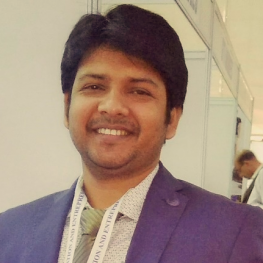
Md Tabish Noori
GET-COFUND MARIECURIE FELLOW AT UAH
Microbial Osmotic Desalination with Energy and Nutrient Recovery (MODERN)
About the research project « Microbial Osmotic Desalination with Energy and Nutrient Recovery (MODERN) »
Research line : Environmental solutions based on Microbial Electrochemical Systems
Mentor: Prof. Abraham Esteve Núñez
Abstract:
Recovery of water and nutrients e.g. NH4+ and PO43-, while treating high strength tannery wastewater (TW), is an attractive outcome to promote the circular economy. A microbial fuel cell (MFC) is a novel sustainable technology to achieve this objective with low-cost and high accuracy. This research proposal suggests a novel approach to simultaneously recover water and nutrients from TW using a hybrid osmotic air-cathode MFC (HOSA-MFC). However, to accomplish this objective, the MFC and their components need to be reengineered with a scientific approach. The electrode materials and the microorganisms at anode are the keys to success of this research. The electrode materials should be cost-efficient and have bi-functionality to serve as anode and the cathode. The Fe-based electrodes have been demonstrated as an excellent low-cost electrode material for MFCs because it can catalyse the oxygen reduction reaction and also can act as mediator for extracellular electron transfer. Further, TW is highly toxic for living organisms because of high salinity, and thus, it will need a special class of bacteria to act as an anode catalyst in such a scenario. This study is for the first time aimed at designing a novel low-cost HOSA-MFC using low-cost Fe-based carbon electrodes for water and nutrient recovery from TW. The HOSA-MFCs will be inoculated with the anaerobic mixed consortia obtained from primary clarifier treating TW. The proposed research project is multidisciplinary, because it combines microbiology, materials science, environmental engineering, process engineering, electronic engineering and MFCs.
About Md Tabish Noori
Md Tabish Noori graduated with a PhD degree in 2018 from Indian Institute of Technology Kharagpur, India an eminent institute of national importance. His major contribution is the R&D of cost efficient electrode materials and polymeric separators for pilot scale bioelectrochemical systems (BES), generating value added chemicals and fuels from real waste streams. He received prestigious SRISTI Gandhian Young Technological Innovation award from the President of India for his research contribution in the development of low-cost and highly efficient polymeric membrane separator for application in BESs. Followed by his PhD, Noori moved to the Indian Institute of Technology Kanpur, India to join RA position in Professor Nishith Verma’s research group and continued working on development of efficient electrode materials for BESs and biosensors (particularly to diagnose Tuberculosis). Later, he was appointed as Brain Korea 21 Plus postdoctoral fellow at Kyung Hee University – global campus, South Korea and worked with Professor Booki Min on development of highly porous electrode materials for BESs to generate bio-alcohols, fatty acids and methane from CO2. Currently, he is a Marie Sklodowska Curie Action GET fellow working with Professor Abraham Esteve Nunez at Universitidad De Alcala De Henares, developing a new low-cost BES for sustainable treatment of tannery wastewater with value added by-product recovery. Till date, he applied an Indian Patent and has published around 36 research articles in the peer review international journals (e.g. Biotechnology Advances, Bioresource Technology, ACS Applied Materials and Interfaces, RSC Sustainable Energy and Fuels, Electrochimica Acta etc.) and 4 book chapters. He presented his works in several national and international science congresses held in India, Germany, Hong Kong, The United States, and South Korea. His current research articles received 287 citations with 9 h-index.


